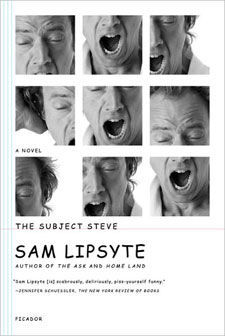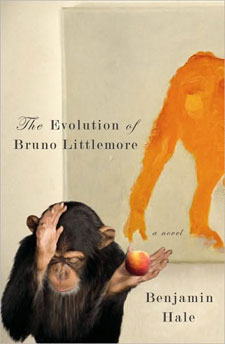Read This: The Subject Steve
 I got a pleasant surprise in my mailbox this afternoon: a new paperback edition of The Subject Steve, the first novel by Sam Lipsyte. It’s a book that never quite found enough of its right audience upon its initial publication, in part because it was sent out into the world on September 11, 2001, and, despite some excellent reviews, America just didn’t seem to be “ready” for a dark satire about the life choices a man makes after he’s told that he’s dying of “something nobody had ever died of before… something absolutely, fantastically new.” There’s an almost kind of dream logic to the way events unfold, and some of those scenes still stick with me, a decade later.
I got a pleasant surprise in my mailbox this afternoon: a new paperback edition of The Subject Steve, the first novel by Sam Lipsyte. It’s a book that never quite found enough of its right audience upon its initial publication, in part because it was sent out into the world on September 11, 2001, and, despite some excellent reviews, America just didn’t seem to be “ready” for a dark satire about the life choices a man makes after he’s told that he’s dying of “something nobody had ever died of before… something absolutely, fantastically new.” There’s an almost kind of dream logic to the way events unfold, and some of those scenes still stick with me, a decade later.
I had the pleasure of interviewing Sam Lipsyte about The Subject Steve, when, among other things, he explained some of the novel’s logic: “I think that the tissue that holds the book together, that makes all the scenes feel as if they belong,” he told me, “is the language, the sentences. I took Steve very seriously as a narrator, as the speaker of this piece. I didn’t want him to be just a receiver of wounds.” You could say that’s something that has stayed true in Lipsyte’s fiction since then: The narrators of his subsequent novels, Home Land and The Ask, definitely have travails to suffer, but they aren’t just butt-ends for cosmic jokes. Lipsyte pitches their voices just right, making them appear that much more plausibly human to us even when their circumstances seem implausible or hover at the edge of the surreal. But this is where it all began, and if you missed The Subject Steve the first time around, I hope you’ll give it a read now.
9 February 2011 | read this |
Read This: The Evolution of Bruno Littlemore
 My latest Shelf Awareness review ran yesterday, for the much-anticipated The Evolution of Bruno Littlemore, Benjamin Hale’s story of a chimpanzee who, after a combination of behavorial experiments and immersion into a human lifestyle, eventually develops the capacity to not just understand but use language… which brings with it the bittersweet gift of human intelligence. (And I do mean much-anticipated: The publisher backed this novel heavily at last year’s Book Expo America, making sure that booksellers and media alike were prepared to receive this as the literary find of 2011.)
My latest Shelf Awareness review ran yesterday, for the much-anticipated The Evolution of Bruno Littlemore, Benjamin Hale’s story of a chimpanzee who, after a combination of behavorial experiments and immersion into a human lifestyle, eventually develops the capacity to not just understand but use language… which brings with it the bittersweet gift of human intelligence. (And I do mean much-anticipated: The publisher backed this novel heavily at last year’s Book Expo America, making sure that booksellers and media alike were prepared to receive this as the literary find of 2011.)
I’m not 100% sold on this novel; as an unreliable narrator, Bruno so overwhelms the narrative that his blind spots when it comes to human nature can threaten to make other characters seem like little more than elaborate foils for his identity-forming adventures—and in a story that hinges so heavily on Bruno entering into the most human of human relationships, the character imbalances can be a serious problem. But there’s so much to enjoy in Hale’s telling—including sly allusions to everything from Shakespeare to Curious George—that I would encourage you, as I often do, to not simply take my word for it but read the novel for yourself and see if you even share my reservations.
8 February 2011 | read this |

 Our Endless and Proper Work is my new book with Belt Publishing about starting (and sticking to) a productive writing practice.
Our Endless and Proper Work is my new book with Belt Publishing about starting (and sticking to) a productive writing practice. 
